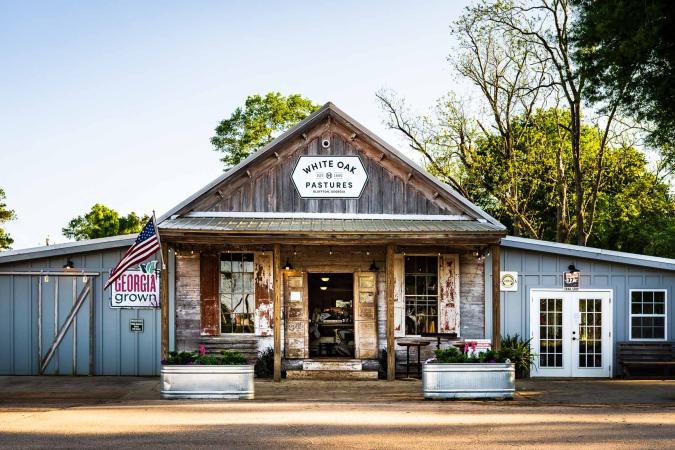Meet the Farmers
Will Harris is the 4th generation of his family to raise cattle in Bluffton, GA, dating back to 1866. He and his children, Jenni and Jodi, along with their spouses and a team of 150 additional employees, steward 5,000 acres of rotationally grazed perennial pasture, two meat processing facilities, a restaurant, general store, and agricultural tourism business. Will’s early adoption of regenerative agricultural practices led him to sell the first American grass-fed meat to several of the largest wholesale retailers in the US. Jenni laid the groundwork for direct-to-consumer e-commerce—a lifeline for both the business and customers during the pandemic. And Jodi oversees the on-farm lodging, restaurant, retail and education.
In WOP’s next stage, the Harris family is continuing their commitment to local impact by transitioning even more of their business model to direct-to-consumer sales which provide the highest quality to the customer and capture the most value for agricultural stewards. They are also committed to sharing their thirty-plus years of regenerative management experience with others by using the farm as an experiential education and training site.
When Will Harris talks about the success of White Oak Pastures, he emphasizes the possibility and need for more farms to follow in their footsteps. “What we’re doing here works very well and was done by a very average guy without a lot of financial resources, so it’s highly replicable. It can be done over and over and over again, and should be.”
Regenerative & Sustainable Practices
According to the Harris family, animal welfare has always been the “canary in the coal mine,” guiding all the rest of WOP’s regenerative practices. “Animal welfare led us to better land management,” Jenni Harris explains, “and better land management led us to a vertically integrated business that built a community.” Across their many business endeavors, the three core elements of White Oak Pastures’ stewardship are: animal welfare, land regeneration, and rural revival.
- Animal Welfare: In 1995, Will Harris’ commitment to animal health led him to abandon the antibiotics, pesticides, and fertilizers that defined 20th century agricultural practice. Transitioning to rotational grazing restored the farm’s degraded crop land and ultimately led to a huge improvement in the health of the soils, animals, and food products. All the animals at WOP are raised on pasture, enjoying open air, room to roam, and highly nutritious forage.
- Land Regeneration: While the initial goal of converting WOP’s annual cropland to permanent pasture and “cattle monoculture” to a diversified model that includes ten different types of pastured meat animals was to improve the animal’s quality of life, it also brought the farm’s 3,000+ acres back to life. White Oak Pastures is now managed as a complex agricultural ecosystem that supports 100,000 beating hearts. A life cycle assessment study conducted in 2019 confirmed the regenerative practices of WOP’s integrated system “is 6 times more carbon efficient than North American average production systems” and results in beef production that is actually net-carbon negative due to the amount of soil carbon sequestered by rotational grazing.
- Rural Revival: Bluffton, GA has a population of 113 people. Through their diversified operation, White Oak Pastures employs 155 people. Instead of trying to chase a version of efficiency that cuts out jobs, the Harris family is committed to using WOP as an economic engine for the region—improving the agricultural ecosystem to create more quality jobs while establishing a sustainable scale of stewardship. WOP employees earn, at minimum, twice the average county wage. WOP also re-opened a general store in downtown Bluffton, which is the only location in a 10-mile radius to purchase fresh food.
- Zero-Waste: White Oak Pastures seeks to operate as a zero-waste farm. By vertically integrating the processing on the farm, they are able to ensure that every part of an animal is used responsibly: meat for food, hides for leather goods, fat rendered for tallow products, and inedible material composted and returned to the pasture soils.
- Certifications: WOP’s pasture-raised meat product lineup includes: Certified Non-GMO, Certified Humane, Certified EOV by Savory Institute, and Certified Grassfed by the American Grassfed Association. WOP vegetables are also certified organic.
- Savory Hub & Educational Tourism: Serving as one of the 15 Savory Hubs in the US, WOP is dedicated to educating others about how to use rotational grazing and regenerative agriculture to restore degraded lands. On-farm tourism and educational events provide another opportunity to engage and teach customers and producers alike. “It is our effort to disseminate the knowledge that we’ve learned over the past 30 years to make regenerative agriculture more replicable,” Jenni Harris notes. “Bringing people to Bluffton and allowing people to take Bluffton home with them is the direction that we have to move in order to stay relevant.”

